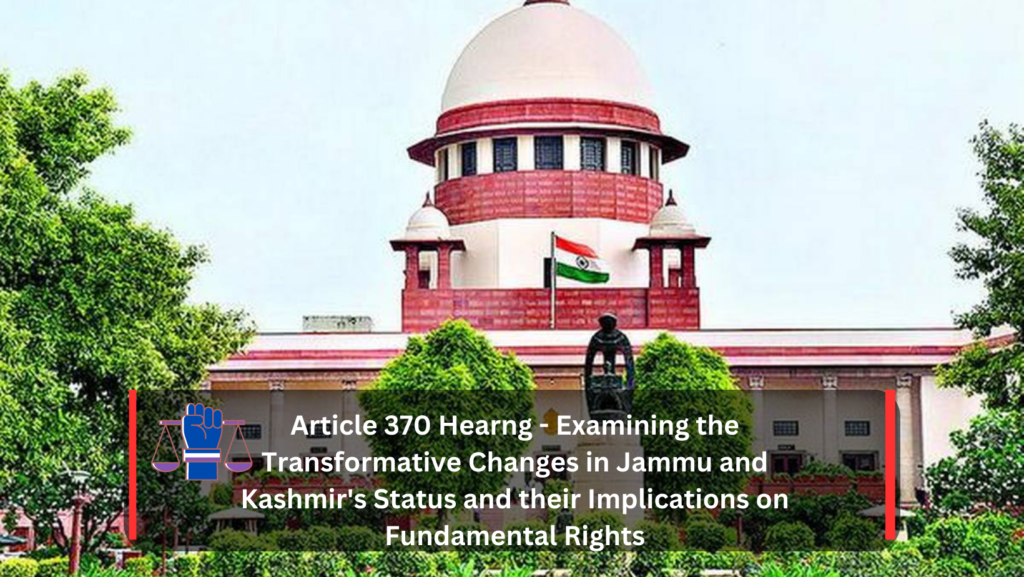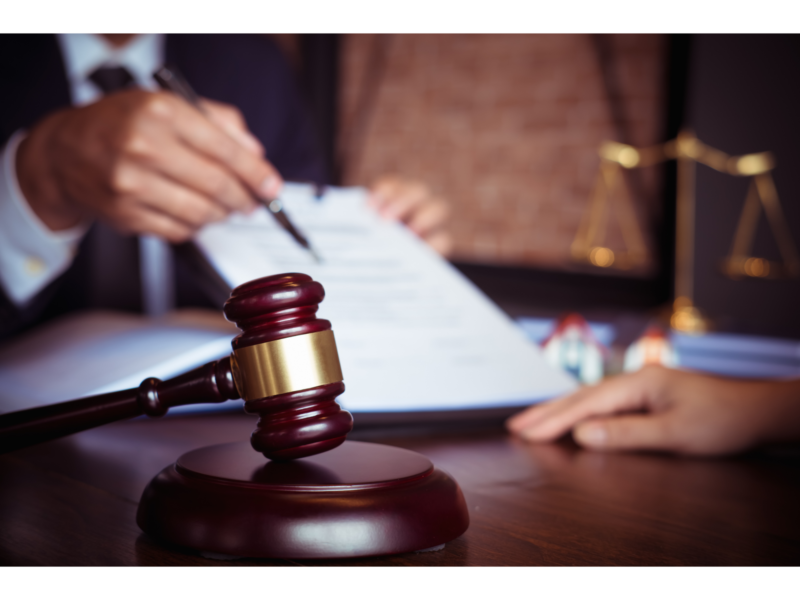On 28th August, the Center conveyed to the Supreme Court that the Home Minister had informed Parliament about the temporary nature of the Union Territory status granted to Jammu and Kashmir, emphasizing that the region’s statehood would be reinstated in due course. Solicitor General Tushar Mehta, representing both the Central Government and the J&K administration, made this statement before a five-judge panel led by Chief Justice of India D Y Chandrachud. The panel is currently addressing petitions challenging the alterations made to Article 370 of the Constitution in 2019.

Key Points on Article 370 hearing
- The Center informs Supreme Court about Home Minister’s statement on temporary nature of Union Territory status for Jammu and Kashmir.
- Solicitor General Tushar Mehta represents Center and J&K administration before Supreme Court.
- Mehta emphasizes specific situations requiring temporary Union Territory status for Jammu and Kashmir.
- Supreme Court observes revoked Article 35A curtailed fundamental rights and judicial review.
- Chief Justice’s remarks on Article 35A’s impact on fundamental rights and judicial review.
- Mehta’s argument on Article 35A’s exclusion of those not meeting permanent residency criteria.
- Mehta defends government’s right to rectify past errors and justifies 2019 actions.
- Creation of distinct permanent resident category and Mehta’s assertion on legality.
- Impact on individuals from Pakistan-occupied Kashmir, including Hindus, Muslims, and non-permanent residents.
- Mehta highlights prohibition of property ownership for non-residents hindering investment.
- Discussion on Constitution (Application) Order of 1954 extending fundamental rights to Jammu and Kashmir.
- Introduction of Article 35A and its exceptions for state employment, property acquisition, and settlement.
- Erasure of fundamental rights and judicial review due to Article 35A, Chief Justice’s observation.
- Mehta’s argument on 2019 constitutional exercise for granting rights and aligning with the country.
- Changing perspective on Article 370 and 35A’s impact on progress, investments, and tourism.
- Judges of Jammu and Kashmir High Court’s oath of allegiance to State Constitution.
- State reorganization aspect and suspension of Article 3’s proviso during Article 356.
- Discussion on Constitutional practice and legality of actions taken.
- Mehta’s response on Parliament’s dual role in reorganization legislation and federal doctrine.
- Mehta’s conclusion on demonstrating actions not undermining federalism.
Details Article 370 hearing
Mehta elaborated before the bench, which also included Justices S K Kaul, Sanjeev Khanna, B R Gavai, and Surya Kant, that there are specific circumstances necessitating the temporary Union Territory status for Jammu and Kashmir.
Simultaneously, during the 11th day of arguments, the Supreme Court observed that the revoked Article 35A of the Constitution, which granted special privileges to permanent residents of the former state, curtailed three fundamental rights as well as the power of judicial review.
The Chief Justice of India made this remark as Mehta pointed out that Article 35A removed references to Scheduled Tribes from Article 15(4) of the Constitution. Mehta contended, “This resulted in the exclusion of those who did not meet the artificially defined criteria of permanent residency, including those who were part of the Scheduled Tribe.”
As Mehta critically examined the exemptions applied to Jammu and Kashmir, the Chief Justice reminded him that he was representing the Government of India, a perpetual entity in constitutional terms.
The Solicitor General argued, “The Government of India has the right to acknowledge past missteps and rectify them, which we did. I am defending that correction. I am not distinguishing between different administrations; it is our government. We are rectifying historical errors to safeguard the future. This is why I am justifying our actions in 2019.”
Mehta highlighted the creation of a distinct category of permanent residents and asserted that laws providing such special privileges would not contravene Article 14 or Article 19 of the Constitution. He emphasized the impact on individuals from Pakistan-occupied Kashmir who were displaced during raids in 1947, both Hindus and Muslims, and on non-permanent residents such as sanitation workers brought in from other states.
Mehta further added, “Despite residing there for decades, individuals from outside Jammu and Kashmir are prohibited from owning property, discouraging potential investment.”
Discussing the Constitution (Application) Order of 1954, the Chief Justice underscored that it extended Part III (fundamental rights), including Article 16 and 19, to Jammu and Kashmir. However, the introduction of Article 35A created exceptions in three areas: state government employment, property acquisition, and settling in the state. The Chief Justice noted that while Part III was applicable, Article 35A essentially revoked three fundamental rights: Article 16(1), the right to own property (formerly under 19(1)(f)), and the right to settle in the state (formerly under 19(1)(e)). This also eroded the power of judicial review.
Mehta argued that this situation persisted until 2019 and clarified that the current challenge involves the constitutional exercise of power by the government, which grants fundamental rights, extends the entire Constitution to the former state, and aligns its people with the rest of the country.
He highlighted that until recently, people believed that Article 370, including 35A, did not hinder their progress but rather bestowed a privilege they fought for. He mentioned that even major political parties had defended these provisions. However, he emphasized the changing perspective, with people now recognizing missed opportunities and welcoming investments and tourism.
Mehta also pointed out that until 2019, judges of the Jammu and Kashmir High Court took an oath of “true allegiance to the Constitution of the State,” even though they were required to uphold the Constitution of India.
Regarding the aspect of state reorganization, Mehta explained that during a Presidential proclamation under Article 356, the proviso to Article 3 was suspended to ensure that Parliament holds complete authority during that period.
The Chief Justice inquired about the Constitutional practice of suspending the proviso to Article 3 during the operation of a Presidential proclamation under Article 356, stating that this practice does not nullify the legality of the actions taken.
Mehta responded that even when the legislature’s views are considered, the difference lies in Parliament’s dual role as both the legislature and the body enacting reorganization legislation. The Chief Justice questioned whether this was consistent with the federal doctrine.
Mehta concluded that he would demonstrate through his arguments that these actions do not undermine federalism.

